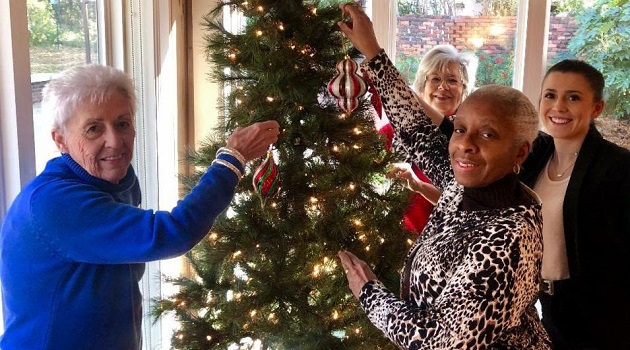Like many of you, I have powerful memories of holidays from my childhood. Christmas snowglobes, nutcrackers, twinkling lights and staying in my pajamas all day long! There are lots of images, smells and things that rest peacefully in my memory, but mostly there are feelings. That’s what a holiday really is, isn’t it?
It’s that feeling we get when we hear the laughter of family and friends, when we make the legendary recipe for the family table when we give or receive that special gift that connects us to the relationships that sustain us. Some of those things are different this year, but the feelings are there for the taking. The memories are there to be re-lived and shared. They say you can’t feel gratitude and unhappiness at the same time, so this year, let’s decide to make what we have be enough.
Let’s be grateful for faith, family, friends and time to reflect on what we have, rather than what we are missing. Our wish is for you to find enough radical resilience in this holiday season to see you through to a brand new year! (with actual hugs!)
Love and Light,
Leeza

Caregiving is stressful enough, but add in a good dose of pandemic with a pinch of holiday preparations and your joy can easily be sucked away.
These tips can help you focus on what is important and manage your expectations.
1. Focus on what is most meaningful.
There are many factors we can’t control when it comes to our loved ones’ health and abilities, so adjust your view of a successful holiday. Try prioritizing the most meaningful holiday activities.
2. Mind your mindset.
Think about what you can accomplish instead of what isn’t getting done. Focus on what your loved ones can do, rather than dwelling on what they can no longer do. Appreciate the help you are receiving rather than resenting those who aren’t supportive.
3. Start new traditions.
Instead of focusing on losses and what you and/or your loved one are unable to do this year, try something new! If your loved one has trouble getting around, drive through a holiday light display, watch a holiday concert on TV or try holiday movie nights. Video chats are great for connecting with loved ones.
4. Anticipate holiday hot buttons.
Certain holiday activities or toxic relatives may trigger stress or unhappy memories. Perhaps unhelpful relatives arrive and criticize your caregiving, or maybe there are old family issues that inevitably flare up at gatherings. It may be best to limit your exposure to — or even avoid — certain places, events, or people. If that’s not possible, prepare yourself. Minimize the drama, and don’t try to resolve problems over the holidays. Instead, try short encounters and have a quick exit strategy.
5. Keep self-care at the top of the list.
Caregivers give and give and give, and during the holidays we give even more. All that giving can leave you running on empty. Find ways to fill your tank. Listen to holiday music, go for a walk, or relax with your favorite holiday scented aromatherapy.
Source: AARP



